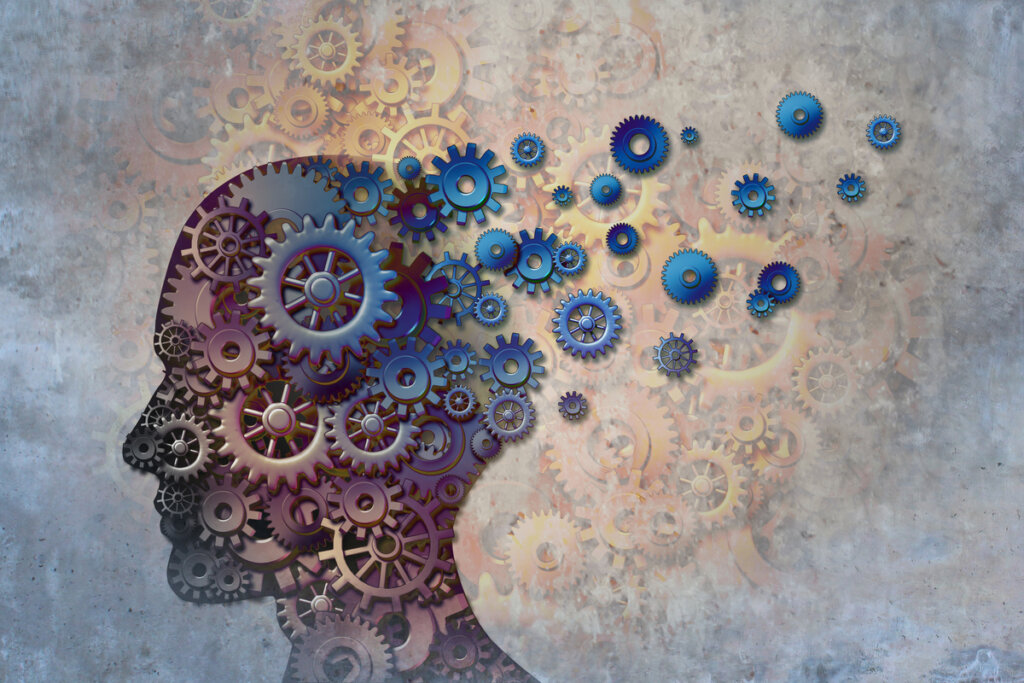Intelligence: More Than Just Good Grades


Written and verified by the psychologist Isabel Ortega
How many times in the past did you think that if you didn’t get good grades it meant you weren’t smart? In Western culture, the belief that grades are closely linked to intelligence and the value of the individual is widespread. However, in other places, such as Asia, it’s effort that’s seen as most important.
On the other hand, there’s no single concept of intelligence, nor is it viewed by all researchers from the same perspective. For example, Howard Gardner developed the theory of multiple intelligences and highlighted eight of them. These were linguistic, logical-mathematical, visual-spatial, musical, bodily, intrapersonal, interpersonal, and naturalistic. For Gardner, these types of intelligence are present in each individual.
According to his approach, there’s no single human intelligence. His theory allows us to value, understand and stimulate the potential of each individual. Therefore, it goes beyond the renowned intelligence quotient (IQ) and its apparent measurements.
We have a tendency to assume that children with good linguistic and logical-mathematical intelligence succeed at school and that all children study in the same way. However, is this fair? Are all children the same?
As Gardner pointed out, what’s important isn’t the fact that there are eight different types of intelligence, as he proposed, but that there’s no single intelligence or independent cognitive processes. As a matter of fact, it’s likely that there are even more intelligences than the eight Gardner proposed.
“I was considered by all my teachers and my own father a fairly average boy, rather below the common standard of intellect.”
-Charles Darwin-

Intelligence
For Gardner, we all have separate specific capabilities. He believes that measuring intelligence causes problems, even more so when there’s no real consensus to define it. In 2007, Resing and Drenth defined intelligence as “the set of cognitive or intellectual abilities necessary to obtain knowledge and to use that knowledge correctly in order to solve problems that have a well-described objective and goal”.
Memory is one more capacity that we possess that helps us retain information and retrieve it. But, sometimes, we tend to confuse memory with intelligence. But, an individual can be highly intelligent yet rather clueless.
What we don’t consider when talking about intelligence
When thinking about intelligence, we often don’t consider the concept of self-knowledge or, in popular terms, knowing yourself. For example, you spend a great deal of time with the person you fall in love with but you spend even more time with yourself. However, how much time, kindness, and patience do you expend in getting to know others, and how much in doing the same with yourself? If you want to be intelligent, your self-knowledge must be transferred to the development of authentic adaptive advantages, such as empathy, social skills, or self-control.
As a rule, we lack an understanding of our own emotional states and those of others. This refers to emotional intelligence, the understanding of our own emotions and those of others.
Emotional intelligence
Goleman highlighted five skills within emotional intelligence: self-awareness, self-regulation, motivation, empathy, and social skills.
“At least 80 percent of success in adulthood comes from emotional intelligence.”
-Daniel Goleman-
Are emotions more important than learning?
As the psychologist and writer Begoña Ibarrola claims, learning and the entire cognitive process that takes place is a binomial in which cognition and emotion go hand in hand. Before, it was thought that learning only involved human cognition, but now it’s known that emotions also play a role.
For example, your emotions influence your memory, making it more selective, both for positive and negative memories. You meet many people throughout your life. Do you remember all of them or only those that have left their mark? It’s important to know yourself and identify your emotions in order to be able to ‘be intelligent’ in the face of any learning that you carry out during your life.
Today, intelligence is seen as a concept that goes beyond getting good grades or performing well academically. We all have the possibility to feel intelligent in certain competencies. However, we often don’t even find out, because we don’t focus our attention on discovering ourselves as people.
Therefore, you must learn to be ‘smart’ for your own sake and your relationships in general, not merely so that others can value you.
“Knowing yourself is the beginning of all wisdom.”
– Aristotle-
How many times in the past did you think that if you didn’t get good grades it meant you weren’t smart? In Western culture, the belief that grades are closely linked to intelligence and the value of the individual is widespread. However, in other places, such as Asia, it’s effort that’s seen as most important.
On the other hand, there’s no single concept of intelligence, nor is it viewed by all researchers from the same perspective. For example, Howard Gardner developed the theory of multiple intelligences and highlighted eight of them. These were linguistic, logical-mathematical, visual-spatial, musical, bodily, intrapersonal, interpersonal, and naturalistic. For Gardner, these types of intelligence are present in each individual.
According to his approach, there’s no single human intelligence. His theory allows us to value, understand and stimulate the potential of each individual. Therefore, it goes beyond the renowned intelligence quotient (IQ) and its apparent measurements.
We have a tendency to assume that children with good linguistic and logical-mathematical intelligence succeed at school and that all children study in the same way. However, is this fair? Are all children the same?
As Gardner pointed out, what’s important isn’t the fact that there are eight different types of intelligence, as he proposed, but that there’s no single intelligence or independent cognitive processes. As a matter of fact, it’s likely that there are even more intelligences than the eight Gardner proposed.
“I was considered by all my teachers and my own father a fairly average boy, rather below the common standard of intellect.”
-Charles Darwin-

Intelligence
For Gardner, we all have separate specific capabilities. He believes that measuring intelligence causes problems, even more so when there’s no real consensus to define it. In 2007, Resing and Drenth defined intelligence as “the set of cognitive or intellectual abilities necessary to obtain knowledge and to use that knowledge correctly in order to solve problems that have a well-described objective and goal”.
Memory is one more capacity that we possess that helps us retain information and retrieve it. But, sometimes, we tend to confuse memory with intelligence. But, an individual can be highly intelligent yet rather clueless.
What we don’t consider when talking about intelligence
When thinking about intelligence, we often don’t consider the concept of self-knowledge or, in popular terms, knowing yourself. For example, you spend a great deal of time with the person you fall in love with but you spend even more time with yourself. However, how much time, kindness, and patience do you expend in getting to know others, and how much in doing the same with yourself? If you want to be intelligent, your self-knowledge must be transferred to the development of authentic adaptive advantages, such as empathy, social skills, or self-control.
As a rule, we lack an understanding of our own emotional states and those of others. This refers to emotional intelligence, the understanding of our own emotions and those of others.
Emotional intelligence
Goleman highlighted five skills within emotional intelligence: self-awareness, self-regulation, motivation, empathy, and social skills.
“At least 80 percent of success in adulthood comes from emotional intelligence.”
-Daniel Goleman-
Are emotions more important than learning?
As the psychologist and writer Begoña Ibarrola claims, learning and the entire cognitive process that takes place is a binomial in which cognition and emotion go hand in hand. Before, it was thought that learning only involved human cognition, but now it’s known that emotions also play a role.
For example, your emotions influence your memory, making it more selective, both for positive and negative memories. You meet many people throughout your life. Do you remember all of them or only those that have left their mark? It’s important to know yourself and identify your emotions in order to be able to ‘be intelligent’ in the face of any learning that you carry out during your life.
Today, intelligence is seen as a concept that goes beyond getting good grades or performing well academically. We all have the possibility to feel intelligent in certain competencies. However, we often don’t even find out, because we don’t focus our attention on discovering ourselves as people.
Therefore, you must learn to be ‘smart’ for your own sake and your relationships in general, not merely so that others can value you.
“Knowing yourself is the beginning of all wisdom.”
– Aristotle-
All cited sources were thoroughly reviewed by our team to ensure their quality, reliability, currency, and validity. The bibliography of this article was considered reliable and of academic or scientific accuracy.
- Gardner, H. (1998). “A Reply to Perry D. Klein’s ‘Multiplying the problems of intelligence by eight'”. Canadian Journal of Education 23 (1): 96–102.
- Ramsden S, Richardson FM, Josse G, Thomas MS, Ellis C, Shakeshaft C, Seghier ML, Price CJ. (2011) Verbal and non-verbal intelligence changes in the teenage brain. Nature. 479, 113-6.
- Resing, W., y Drenth, P. (2007). Intelligence: knowing and measuring. Amsterdam: Editor NieuwezijdsGardner, Howard.
This text is provided for informational purposes only and does not replace consultation with a professional. If in doubt, consult your specialist.







